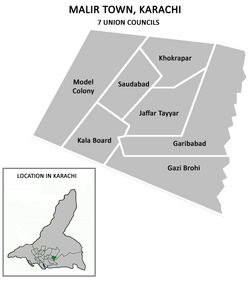Malir Town
Malir Town
ملير | |
|---|---|
 Union councils of Malir Town | |
| Coordinates: 24°53′35″N 67°11′43″E / 24.89306°N 67.19528°E | |
| Country | Pakistan |
| Province | Sindh |
| City District | Karachi |
| Established | 14 August 2001 |
| Union Councils | |
| Government | |
| • Type | Town Council |
| • Town Nazim | Syed Naveed Akhter |
| • Haseeb Raza | Farrukh Riaz |
| • Municipal Officer | niek |
| Population (1998)[1] | |
• Total | 981,270 |
| Office Location | Near Saudabad Police Station, Kalaboard, Malir Colony, Karachi. 75080 |
| Website | Malir Town Page |
Malir Town (Template:Lang-sd Template:Lang-ur) is one of the 18 towns of Karachi City, located in the eastern part of Karachi, Sindh, Pakistan. Malir town is bordered by the Jinnah International Airport and the Malir Cantonment to the west and north, the Malir River and Shah Faisal Town to the south and Gadap Town to the east across the Thado Nallo stream. Malir has been regarded in history as the countryside of Karachi City due to its open atmosphere and lush green farms, but now these are no more. Before the independence of Pakistan, there were small villages of Sindhi and Kalmati Baloch in the Gadap Town and Malir Town of modern Karachi. Now both towns are developed as the suburbs of the city because of the urban sprawl.
There are several ethnic groups in Malir Town including Sindhis, Punjabis, Muhajirs, Kashmiris, Seraikis, Pakhtuns, Balochis, Brahuis, Christians, Memons, Bohras, Ismailis, however Sindhi and Baloch form majority in the town.
Malir was once famous for its fruit and vegetable farms; but, now due to severe scarcity of groundwater, these farmlands are being converted into residential areas, thus increasing urbanization and environmental degradation. The Society for Conservation and Protection of Environment (SCOPE) has been concerned about drought and desertification in Malir district and has launched a campaign against illegal sand and gravel mining in dry river beds of Malir and its tributaries. Because sand and gravel mining cause lowering of ground water, as rainwater can cannot percolate in the aquifer. SCOPE is developing rainwater reservoirs in drought affected rural areas.
If the Aquifer in Malir can be recharged enough by storing rain run off water, it can restore greenbelts around Karachi.
Sharfuddin Shah Wilayat was a Sufi master in Malir neighbourhood of Malir Town.
Epidemic of mysterious Chikungunya virus
Due to pollution, mainly resulting from garbage dumps and overflow of sewerage water, Emergency declared in Malir Town, as thousands of patients were affected by mysterious Chikungunya virus in December, 2016. Despite joint denial by WHO and Health Ministry of Pakistan, Provincial Government of Sindh discloses that aedes aegypti mosquito is responsible for spreading Chikungunya in the area.[2][3]
Neighbourhoods
- Walidad Goth
- Soomar Kandani Khaskheli Goth
- Indus mehran society
- Hashim Khaskheli Goth
- Soomar Ismail Khaskheli Goth
- Gharibabad
- Ghausia Colony
- Ghazi Brohi Goth
- Gulistan-e-Rafi
- Gulshan-e-harooni
- Gulshan-e-Qadri
- Gulshan-e-Yousaf
- Hussainabad
- Jaffer-e-Tayyar
- Jam Goth
- Jinnah Square
- Kala Board
- Kausar Town
- Khokhra Par
- Khoso goth
- Liquat Market
- Lyari Basti
- Memon Goth
- Millat Town
- ANWER_E_IBRHIM
- Model Colony
- Moinabad
- Mulla Essa Goth
- Nafeesabad
- Nashtar Square
- Old Shafi Mohammed Goth
- Pak Kausar Town
- Raza plaza
- Salar Goth
- Saudabad
- Shaban Town
- Taiser Town
- Urdu Nagar
- Aso Ghot
- Soomar Kandani Village
- Model Cololy
- tariq bin ziaad
- rafaay-e-aam society
See also
- City District Government Karachi
- Malir Development Authority
- Sindh Baloch Cooperative Housing Society
References
- ^ http://www.yespakistan.com/hdf/karachi/karachi.asp
- ^ Khawar Khan (20 December 2016). "More patients arrive at Karachi hospital with symptoms of mysterious virus". Geo News tv. Retrieved 21 December 2016.
- ^ "Aedes aegypti mosquito responsible for Chikungunya virus in Karachi: report". Dunya News tv. 21 December 2016. Retrieved 21 December 2016.
